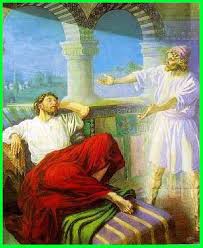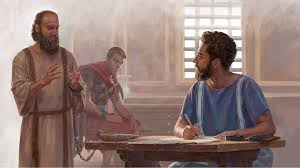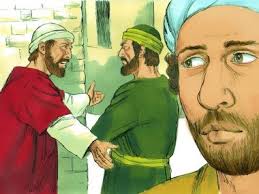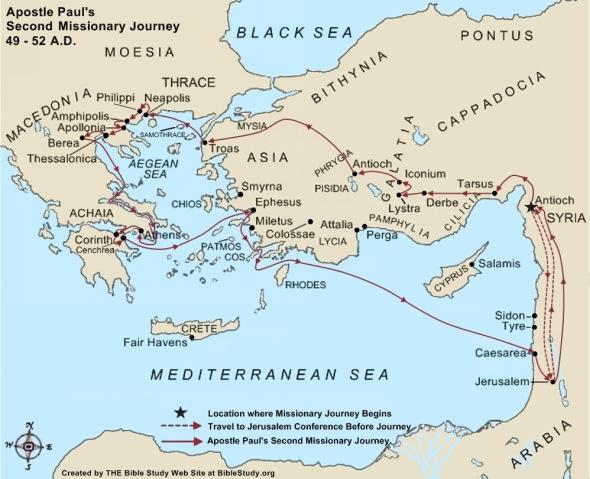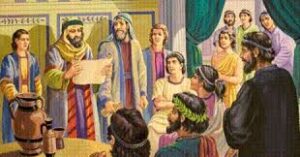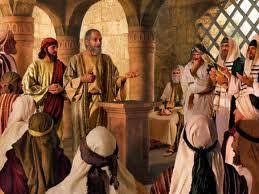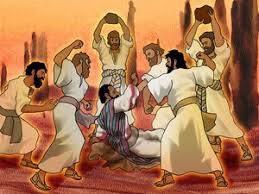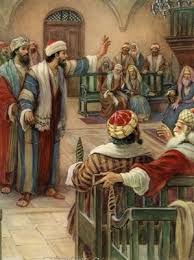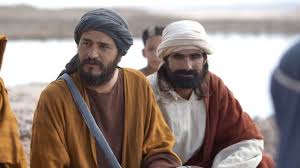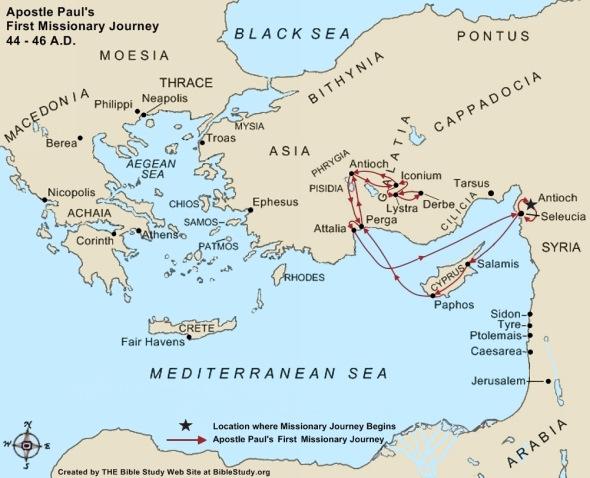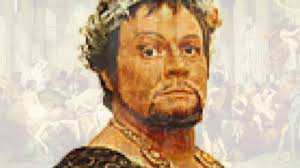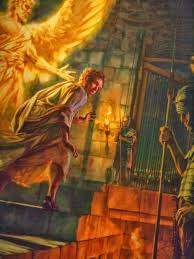Bz – Paul and Silas in Prison 16: 16-40
Paul and Silas in Prison
16: 16-40
50-51 AD
Paul and Silas in Prison DIG: Why was Paul irritated with this servant-girl? You would think he would be pleased with her announcement. When Paul and Silas were seized, what was the charge against them? What happened to them? What does the response of Paul and Silas say about them? If you were the jailer, what would you think of Paul and Silas singing? Escaping? Remaining? In what ways does the jailer express his new faith in Yeshua? Given the charge against them in verses 20-21, why might Paul insist on his rights as a Roman citizen because most residents in the Roman Empire did not have the privilege of citizenship. How would this diffuse tensions for this young Philippian church?
REFLECT: The girl’s owners rejected the gospel because it cost them financially. What financial concerns keep some people from the faith today? Is this a factor for you? About twelve years later Paul wrote a letter to the Philippians from another prison. How might the events here be the basis for what Paul said in Philippians 4:4-7, 12-13? What can you learn from his example about knowing peace and joy even in hard times? If asked, “What must I do to be saved?” how would you answer? Called to leave, or called to stay. Which one of these describes your calling in regard to your life history?
Now we have a new scene, but it connects with the previous one (to see link click By – Lydia’s Conversion in Philippi) to make a seamless story. After meeting Lydia, the liberated woman, we meet an enslaved woman. No sooner are lost people saved than the Adversary begins to hinder the work. Here, as in Samaria (see Ba – Simon the Sorcerer) and Cyprus (see Bn – Barnabas and Sha’ul Sent Out from Syrian Antioch), was a clash of light and darkness. There are only two types of people in the world. Those whom the law of the Spirit of life in Messiah Yeshua has set free from the law of sin and death (Romans 8:2) and those dead in [their] trespasses and sins (Ephesians 2:1). There are only the slaves of unrighteousness and the slaves of righteousness (Romans 6:16-18).378 The enemy of souls (Matthew 13:39), sought to infiltrate the church or to crush it with persecution. Both avenues of attack would be unsuccessful.
Spiritual opposition: It so happened that as we were going to the place of prayer (16:13), we met a slave girl who had a spirit of divination (Greek: puthona, meaning a python spirit). The Greek text literally reads the spirit of a python. That designation comes from Greek mythology, in which the Python was a snake that guarded the famous oracle of Delphi (the most important shrine in all Greece). Eventually, Apollo, the god of prophecy, killed the Python. Since it was believed that Apollo spoke through the oracle of Delphi, the term ‘python” came to refer to anyone in contact with Apollo. In modern terms, this slave girl was a medium in contact with demons, and she was continually bringing her masters much profit from her fortune-telling. Such people were believed to be able to predict the future, a valuable commodity in the Greco-Roman world as they valued divination highly. Thus, she was a veritable gold mine for her owners (16:16).379
Following after Paul and us, she kept shouting, saying: These men are servants of God Most High, who are proclaiming to you the way of salvation (16:17). Here we see demonic recognition of who they were, just as in the gospels demons always recognized who Yeshua was. Demons also recognize the true way of salvation. None of this would have been very clear to Gentiles. The term God most high was a common term for God in the TaNaKh, but the same term was equally common in the Gentile world and was particularly applied to Zeus. Neither would the way of salvation be immediately clear to a Gentile audience. The Greco-Roman world was full of “saviors.” Savior/deliverer, salvation/deliverance were favorite terms. The emperor named himself “savior” of the people. All of which is to show why Paul finally became irritated with the girl’s constant announcements.
The “us” or “we” passages stop at verse 17 and does not reappear in Acts until Paul’s return to Philippi in 20:6 (see Bx – Paul’s Vision of the Man of Macedonia). Some have seen this as an indication that Luke remained behind to minister in Philippi and did not rejoin Paul in his travels until his return visit at the end of his Third Missionary Journey (see Ci – Paul Raised Eutychus from the Dead at Troas). But here, it seems to indicate in the present context that Luke and Timothy had dropped out of the picture at this point and were ministering somewhere else. That is the reason only Paul and Silas were arrested (see below).
She kept doing this for many days and Paul tolerated it for a while. But after many days Paul was irritated. These declarations may have been true enough, but they were open to too much misunderstanding for pagan hearers. The truth could not be so easily condensed for those from a polytheistic background. Yeshua might be seen as just another “savior” in the expanding pantheon of Greek gods.380
Finally, when he had enough of this, Paul turned to the evil spirit, in a form reminiscent of Messiah’s exorcisms, declared: I command you in the name of Messiah Yeshua to come out of her!” And it came out (Greek: exelthen) of her that very moment (16:18). Powerful as they are, even the demons must submit to the authority of Yeshua Messiah (Mark 1:23-27). Note that in expelling the demon Paul did not address the girl but the demon, and he did not rely on his own authority, but that of Yeshua in contrast to those in 19:13-16. But that was not the only thing to vanish. Along with the demon, her masters saw their prospects for further profit also exited.
The arrest: But when her masters saw that the hope of profit was gone (Greek: exelthen), they grabbed Paul and Silas and dragged them into the marketplace, the court of law, before the authorities. Luke probably intended the wordplay. He used the same verb (Greek: exelthen) for the demon’s coming out in verse 18 as for the money going away. The latter created a problem. Healing the demon possessed girl was one thing; but when that involved considerable economic loss, well, that was quite another! The profit motive was a frequent obstacle to the gospel in Acts. It was surely the downfall of Simon Magus (see Ba – Simon the Sorcerer). It would lead Demetrius and his fellow Ephesian silversmiths to violently oppose Paul (see Ch – Idol-Makers Start a Riot in Ephesus). Here the greed of the slave girl’s owners is contrasted with the generosity of Lydia, who shared her house with the missionaries and the Philippian believers (16:15).
The owners of the slave girl were careful in their charges to avoid the real issue of her healing and their resulting loss of profit. And when “the business men” brought them to the chief authorities, they said, “These men are throwing our city into an uproar! Being Jewish, they are trying to convert Roman citizens to Judaism (which was illegal in Philippi being a Roman colony) and advocate customs which are not permitted for us to accept or practice, being Romans” (16:19-21). Their purpose was only to stir up the mob, thus anti-Semitism throughout history.
In the Roman Empire, there were two very different laws; one for citizens of the Roman Empire, and one for those who were not citizens. Roman citizens had specific civil rights there were zealously guarded. Non-citizens had no civil rights, and were subject to the whims of the chief authorities. They were greatly upset that Roman citizens should be harassed by strolling peddlers of an outlandish religion . Such people had to be taught to know their proper place and not trouble them.381
None of the charges were true, but they had their effect. Then the crowd joined in the attack on them. So the chief authorities ripped their clothes off them and repeatedly commanded them to be beaten illegally with rods (16:22). Flogging was considered to be an appropriate punishment for those indicted on counts of causing civic disturbance. Although such corrective beating was applied in such cases to both slaves and free men, it could be administered with different instruments, the respective use of which would cause greater or lesser injury (22:24-25). Luke’s description of the flogging which the missionaries received shows that it was severe. The rods would open wounds that would have left bloody welts needing to be cleansing (16:33).382
There was no mention of a trial or a defense. The chief authorities had simply taken the word of their fellow Romans and acted accordingly. The authorities did not know Paul and Silas were Roman citizens so they were treated like mere foreigners without local rights and privileges, and Jewish ones at that. When anti-Semitic feelings run high, justice also flees. Paul could have declared, “I am a Roman citizen!” But, evidently, Paul only chose to use his Roman citizenship when if furthered the advancement of the gospel, not when it merely personally advantageous for him to do so. Paul’s sense of identity came first from his faith in Yeshua, secondly from his Jewish heritage, and only thirdly from his Greco-Roman heritage.383
After inflicting many blows on them, they threw them into a maximum security prison, ordering the jailer to guard them securely. Having received this charge, he threw them into the inner prison, a dungeon with no light or air except what came through when the door was opened, and fastened their feet in the stocks (16:23-24).384 But all those safeguards were to prove futile. Like Herod (12:6-11) and the Great Sanhedrin (5:19-25) before them, the chief authorities at Philippi were to learn that no prison can hold those whom God wants released.385
Salvation for a Jailer’s Household
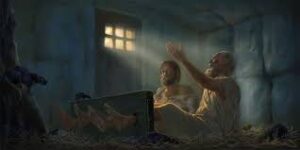
We are not surprised to find Paul and Silas miraculously delivered from jail. It had happened before, to the apostles (see Au – The Apostles are Persecuted) and to Peter (see Bk – Peter’s Persecution and Deliverance). After having been severely beaten, they found themselves in a filthy dungeon. Their feet were fastened in stocks designed to induce painful cramping by spreading their legs as wide as possible. In spite of it all, they maintained a joyful attitude.386 But about midnight, Paul and Silas were praying and singing hymns to God, and the prisoners were intently listening to them (16:25). The night lacks the kindness of the day when demands and activities can distract us. But despite their anguish, their prayers ascended before the throne, and God gave them sings in the night (Job 35:10). Prayers come naturally when we are in agony – but songs? Their voices were unchained, penetrating walls and bars. We can preach the gospel in many ways, but the message is never clearer than when God’s people refuse to cease their praises during intense suffering. In their bondage, Paul and Silas were free to sing; they were also free to stay (see the commentary on Romans Ag – Paul, A Slave of Messiah Yeshua).
Suddenly their songs were eclipsed by the rumblings of an earthquake, and there was such a great earthquake that the foundations of the prison were shaken before an awesome God. Immediately all the doors were unlocked, and everyone’s chains came loose from the walls. When the jailer woke up from the earthquake and saw the prison doors opened, he drew his sword and was about to kill himself, supposing the prisoners had already escaped. According to Roman law, if a prisoner escaped, the jailer who was in charge had to suffer his sentence. This accounts for the despair of the jailer in this case. He preferred death by his own hand to being tortured to death, which obviously awaited some of the condemned prisoners who had supposedly escaped.387 But Paul could see what was about to happen and cried out with a loud voice, saying: Don’t harm yourself! We’re all here (16:26-28)!
Sometimes ADONAI frees us from chains so we can turn our backs on our slavery and walk away like Peter did (see Bk – Peter’s Persecution and Deliverance). He was free to leave. As a result, the Messianic community that was praying for his release was encouraged. Other times, however, God frees us from chains so we can remain where we are to share the message of freedom with other captives.388 When the jailer called for torches and rushed in; and trembling with fear, he fell down before Paul and Silas. It was obvious that the jailer saw something divine. After he brought them out of the jail, he said, “Sirs, what must I do to be saved” (16:29-30). He had overheard the prayers and singing of Paul and Silas and he knew they had the message of salvation. Now he was ready for understanding. The miracle of the earthquake and the prisoners who wouldn’t escape got his attention and prepared his heart to receive Pau’s message.
It could not be put any simpler. They said: Put your trust in the Lord Yeshua and you will be saved – you and your household. At some point the jailer’s household entered the picture. Luke did not specify when.389 But unlike the rich young ruler (see the commentary on The Life of Christ Il – The Rich Young Ruler), his family, servants, and perhaps relatives or guests who were staying with him all heard the gospel. Then they spoke the word of the Lord to him, along with everyone in his household (16:31-32). When the gospel is preached to hearts prepared by God, results are inevitable. The jailer and each members of his household were saved.
The truth that salvation is wholly by faith in the Lord Yeshua Messiah permeates the Scriptures. There is salvation in no one else, for there is no other name under heaven given to mankind by which we must be saved (4:12)! That marvelous truth was at the heart of the teaching of the emissaries (Acts 2:38, 5:14, 8:12, 10:43, 11:17 and 21, 13:12 and 38-39, 14:1, 15:11, 17:12, 18:8). Yeshua Himself declared: I AM the way, the truth and the life; no one comes to the Father, but through Me (John 14:6). It is also the constant there of the epistles (Romans 3:20-25, 5:1; First Cor 6:11; Galatians 2:16, 3:24; Eph 2:8-9; 2 Timothy 3:15; Titus 3:7).
To believe in the Lord Yeshua Messiah means, first, to trust that He is who He claimed to be. The emissary Yochanan declared: But these things have been written so that you may believe that Yeshua is Mashiach Ben-Elohim, and that by believing you may have life in His name (Yochanan 20:31). Secondly, it means to believe what He did. Paul concisely summarized the work and ministry of Yeshua this way: For I also passed on to you first of all what I also received, that Messiah died for our sins according to the Scriptures, that He was buried, and that He was raised on the third day according to the Scriptures (First Corinthians 15:3-4). To the Romans he wrote: For if you confess with your mouth that Yeshua is Lord, and believe in your heart that God raised Him from the dead, you will be saved. For with the heart it is believed for righteousness, and with the mouth it is confessed for salvation (Romans 10:9-10).390
Four of his actions show that the jailer’s salvation was sincere. First, he took Paul and Silas that very hour and washed their wounds (John 13:35). Second, he and all his household were immersed and at once. By that act they publicly identified themselves with Yeshua Messiah. Though the hour was late, other people were no doubt were still outdoors because of the earthquake. Third, the jailer brought them to his house and set food before them. Paul and Silas apparently accept what was set on the table without any question. Although it is doubtful whether the jailer gave thought to providing a “kosher meal,” particularly in the middle of the night and in the aftermath of a rather severe earthquake, he may well have served something permitting to Paul and Silas to eat – or they at least ate what they could of what he offered.391 Finally, he was overjoyed that he with his entire household had put their trust in God (16:33-34). A short time earlier he was ready to commit suicide. Now he was overflowing with the joy that comes from knowing one’s sins are forgiven (Psalm 32:1; Romans 4:7). Only God can turn around a life so quickly.
What about the other prisoners? Luke doesn’t give us any of the details, but we must assume that they stayed also; otherwise, the jailer would have suffered the consequences of their sentences and no evidence of that exists. Possibly some of them were also born again through the witness of Paul, Silas and the jailer.392
The departure from Philippi: When the next day came, the chief authorities sent their police officers, saying, “Release those men.” But the jailer reported these words to Paul, saying, “The chief authorities have sent orders to release you. So come out now, and go in shalom.” But now Paul was the accuser and not the victim, and he said to the officers, “They have beaten us publicly without a trial – men who are Roman citizens – and have thrown us into prison. And now they are sending us away secretly? No indeed! Let them come themselves and lead us out” (16:35-37)! Paul had the upper hand. This would be a public acknowledgement that they were wrong. The treatment of Paul and Silas, being Roman citizens, was illegal in three different ways: (1) binding them in stocks; (2) beating them; and (3) failing to give them a trial. Since claiming falsely to be a Roman citizen was punishable by death, usually no one questioned someone’s claim since the penalty was so severe.393
The police officers reported these words to the chief authorities. They became afraid for their own lives when they heard that they were Roman citizens, so they came and apologized to them. They did exactly as Paul wanted them to do. After they escorted them out of the prison, they continually kept on begging them to leave the city because the chief authorities knew that they were in danger of being punished themselves under Roman law. What a reversal of fortune. Paul and Silas had been treated as criminals and were innocent. But, the chief authorities who condemned them now found themselves as the genuine lawbreakers! When Paul and Silas went out of the prison, they did not leave Philippi immediately, but instead, visited Lydia’s house to further the gospel. And when they saw the brothers and sisters, they encouraged them and then departed (16:38-40). So a church had been planted in Philippi, to which the letter to the Philippians would later be written.394
The wealthy business woman, the exploited slave girl (who was probably saved as a result of the exorcism), and the rough Roman jailer had been brought into brotherly and sisterly relationship with each other and with the rest of the Philippian church. True, they experienced some tensions, and in his letter to the Philippians, Paul had to exhort them to stand firm in one spirit – striving side by side with one mind, united in spirit, with one purpose (Philippians 1:27, 2:2).395
Once again Satan’s plans were frustrated and overruled by ADONAI’s sovereign control of events. The persecution of the Adversary unleashed to destroy the Philippian church merely added another household to it and gained its protection from the city’s chief authorities. For those who boldly preach the gospel and praise Him no matter what the circumstances, YHVH stands ready to turn persecution into production. As the Church father Tertullian wrote in his book, the Apology, said, “The blood of the martyrs is the seed of the Church.” But as we will see later in the book of Acts, it is just as true that the growth of the Church almost always leads to persecution.
Deep calls to deep, Lord, in the roar of Your waterfalls; all Your waves and Your breakers have swept over me. You will send Your faithful love by day; Your song will be with me in the night – a prayer to the God of my life (Psalm 42:8-9). I cling to this hope, and pray for a song.396




